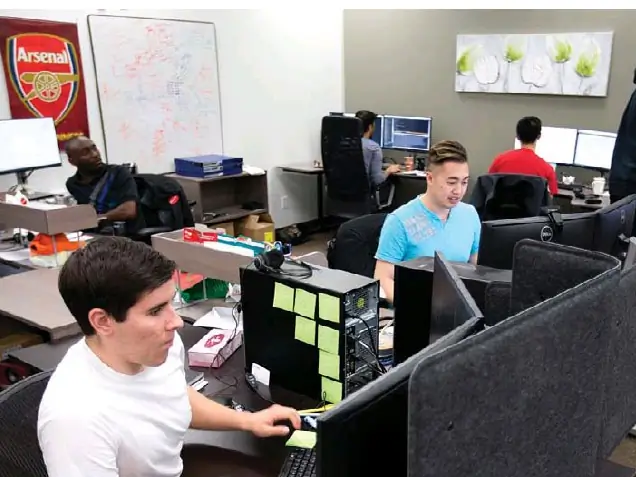
Kanata North is home to more than 500 companies, making the area unrivalled access to talent.
Location’s one of the first things Bruce Linton considered when he launched Martello Technologies, a software-as-a-service (SaaS) company that develops and manages cloud-based communications systems.
He put Martello in an office right on the path between the Mitel Tower and the campus cafeteria. Then he mounted a monitor outside his company offices with a sports ticker, a trivia-and-technology roll, and Martello news bites.
Mitel employees, a fertile source of recruitment, headed for lunch couldn’t help but pause and, when they read the latest news on hoverboards, a Martello release came right on its heels.
“You want frequency of touch, or frequency of visibility to be high, not an annual event,” Linton said. “So in Kanata North you can actually get that location, location, location to your targeted partner pretty dialled in.”
Kanata North is home to more than 500 companies employing 21,000 people. The talent pool is huge, the opportunities for collaboration virtually endless, and the market base is worldwide.
Linton’s a regular at TEDx Talks, modelled on the renowned TED (Technology, Entertainment, Design) Conferences, and Tech Tuesdays, a monthly meetup of the likeminded at the Marshes Golf Club.
“What ends up happening is that it’s a layering on or the interaction with the people you might have met the week prior or two weeks prior at a quarterly business review or a product definition review or a demo cycle,” Linton said. “Now all of a sudden you’re meeting them socially. The trust equation starts to get higher and deeper and the effect is, each quarterly business review gets a little bit more productive.
“I think that whole ecosystem cohabitating in a reasonably tight kind of geographic pocket really does make a difference.”
The L-Spark incubator and accelerator is close by, providing individualized mentorship for SaaS providers, especially, with targeted support and exceptional access to partners, investors and key contacts.
Entrepreneurs from across the country apply to get in for six-month incubation periods, launching ideas from development to marketing and sales.
Among L-Spark’s alumni is Steve Cody, president and founder of the Better Software Co., which develops comprehensive software solutions for small business. In less than a year, his Kanata North-based company has opened offices in seven world cities.
“We’ve found great employees at Tech Tuesdays,” Cody said. “We’ve found great partners who want to sell our product. We’ve found customers and we build business relationships. They’re good, really good.”
All his firm’s support network is in Kanata North, including his lawyer and his accountant. The Better Software Co. holds meetings at the Brookstreet Hotel down the road and its off-site training at the nearby Marshes.
Linton said the tech industry has come a long way.
“With SaaS, you can take a great idea, find a few really skilled developers, and your customers can be deployed very quickly,” he explained, noting its efficiency, cost predictability and service-and-support reliability.
Kanata North is an ideal ecosystem for innovation to take root and grow, he said. “You have a talent pool that has come out of some of the big telecom players, and many of them have gone on to found startups and scale them.”
Meanwhile, L-Spark cranks out success stories. Nineteen companies have “graduated” in two years, enhancing Kanata North’s reputation as a successful, resourceful and continuously growing community where opportunity is often just steps away.
“We’re enjoying a resurgence right now,” said Steve Langford, vice-president of marketing at Wesley Clover International Corp., the investment, management and holding company that operates and majority owns L- Spark.
The key going forward, he said, is to mitigate some of the cyclical nature of the tech business, nurture more sustainable companies, and develop a more tightly integrated and resilient ecosystem that can compete on the world stage.
Langford said area companies are constantly looking beyond Canada’s borders for markets and just around the corner for collaborators. Martello has staff in Canada, the U.S. and France. It’s deployed on 5,000-plus networks in 18 countries.
“As technologies become more portable, more mobile-centric, more standardized, there are greater opportunities to collaborate and enhance and share innovation,” he said.
“I think the general sense of community and growth is really strong right now. Your customer base, regardless of your product, is out there. You don’t need to beat the guy up across the street.”
